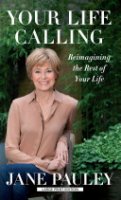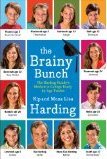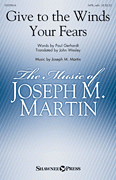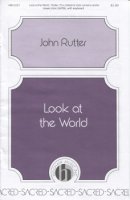Sunday, September 21, 2014
Give to the Winds Your Fears (words by Paul Gerhardt, translated by John Wesley; music by Joseph M. Martin; Shawnee Press 35029616)
Porter graciously waited in the airport so I could sing this one with the choir. It was a special day because we had a guest cellist to play with us. (You can hear the cello part with the anthem, though not our performance, at the link above). The anthem itself was notable for a couple of reasons. First, the words (albeit in translation) are by Paul Gerhardt, a German hymn writer I've come to appreciate thanks to Stephan's efforts. Second, although I'd never heard of this hymn before, I encountered it again in a Christianity Today article on the temperance movement. (I've included the link, but you'll only just be able to start reading this one unless you're a subscriber.)
Many temperance advocates also promoted voting rights for women. After all, women were more likely than men to vote to shutter the saloons that were destroying their homes. Carrie Nation and her hatchet may be the most famous image, but the 1873-74 Woman's Crusade—which led to the founding of the Woman's Christian Temperance Union (WCTU)—is a more accurate representation, with its crowds of nonviolent protesters linked arm-in-arm before saloon doors. A later WCTU historian described the crusade in Ohio:
Walking two by two, the smaller ones in the front and the taller coming after, they sang more or less confidently, "Give to the Winds Thy Fears," that heartening reassurance of Divine protection now known to every WCTU member as the Crusade Hymn. Every day they visited the saloons and the drug stores where liquor was sold. They prayed on sawdust floors or, being denied entrance, knelt on snowy pavements before the doorways, until almost all the sellers capitulated.
Here's something else I learned from the article:
There are a number of misconceptions about the 19th-century temperance movement. The first, which was shared by temperance activists themselves, is that it didn't work. In fact, it did. American drinking dropped dramatically after the temperance movement took off in the 1830s. Americans in 1830 were drinking 7.1 gallons of absolute alcohol per year per person. ... By 1835, they were down to 5.0 gallons; by 1840, 3.1. By 1910, shortly before Prohibition, this had dropped to 2.6 gallons; post-Prohibition, it was down to 1.2.... Even after every moral loosening the 20th century wrought, from flappers to the counter-culture movement, by the year 2000, the average American drank less than a gallon of absolute alcohol. That's more than six gallons less a year than their ancestors had about 200 years before.
 Your Life Calling: Reimagining the Rest of Your Life by Jane Pauley (Simon & Schuster, 2014)
Your Life Calling: Reimagining the Rest of Your Life by Jane Pauley (Simon & Schuster, 2014)
This is why we have friends. I would never have picked out this book to read. For one thing, I tend to avoid books by or about celebrities. For another, I in no way can identify with people who, when their children go to school, or leave home, or when they turn 50, or retire, say, "What on earth am I going to do with the rest of my life?" I don't need a new life; I have enough planned in the one I have now to see me through more productive years than I can possibly have left.
But a friend highly recommended Pauley's book, and I'll admit that it kept my interest even though I didn't buy into its focus. The Penzey's fans among my readers will best understand the effect that Your Life Calling had on me. It was very much like reading a Penzey's catalog, where I find myself repeatedly annoyed by the self-aggrandizement, the leftist slant, and the in-your-face distain for several of my strongly-held principles—yet I keep reading, because the stories are interesting and inspiring.
Pauley premise is that our generation is the first to have the long lifespan and the leisure to "reinvent" ourselves, possibly several times as we go through life. Today's young people are already doing it ("what we call reinvention is just 'the churn' for them"). In fact, for them it may be more of a necessity, given the pace at which technology (and thus the job market) is now changing. (The last sentence is my analysis, not Pauley's.) But it's new for us.
You may be surprised to know that people over fifty-five represent the largest age group of owners of new business start-ups. At an age when our own parents and grandparents expected to wind things down, people are getting a second wind.
The Stanford Longevity expert, Laura Carstensen, notes that withour new vitality come some pretty big questions. She says, "Those of us living today have been handed a remarkable gift with no strings attached—an extra thirty years of life for the average person. Now that gift is forcing us to answer a uniquely twenty-first-century question—what are we going to do with our supersized lives?"
Permit me an exasperated wail at yet another expert who misunderstands the term "life expectancy." But aside from that, it is true that our generation finds itself thinking in terms of second, often radically different, careers more than previous generations. One only needs to listen to someone of my parents' generation talk to realize that the men, at least, defined themselves very much by their careers. Of my generation this is less true, mostly I think because we were betrayed by the "be loyal to your company and your company will be loyal to you" compact. What is "me" is not my employment, and therefore I am free to move on to something entirely different.
That I get, as evidenced by my need to elaborate on it. I also appreciated Pauley's description of Imposter Syndrome: (More)
It was good to sing this one again.
Sunday, September 14, 2014
To Love Our God (Mark Hayes, Hinshaw Music HMC1576)
Forget Area 51, the NSA's invasive civilian spying, and anything else you may think the U.S. government has tried to keep up its sleeves. Edward Snowden has nothing on me. I will now reveal to you the government's greatest secret:
The United States Post Office has discovered instantaneous transport!
Here at Lift Up Your Hearts! we have obtained a copy of the official government record of a small package sent between the United States and Switzerland. (Not to CERN, but to what our sources indicate may be the home laboratory of one of its top up-and-coming scientists.)
There it is, ladies and gentlemen: the Secret of the Century is out. And you thought only quantum particles could be in two places at the same time.
Next up for our intrepid investigative reporters? Digging into the dirty secret of why it still takes four days to travel the 250 miles from Altamonte Springs to Miami.
Permalink | Read 1654 times | Comments (1)
Category Just for Fun: [first] [previous] [next] [newest]
"Great goddess Athena, great god Apollo, we ask that you impart wisdom in these proceedings today," Jennifer Zarpentine, a Wiccan priestess, prayed at the town board meeting of Greece, New York, in April 2008.
"Help the board to make the right, informed decisions that will benefit the greater good of this community. This we ask of you." As board members continued to bow their heads in prayer, several other meeting attendees responded with the pagan version of amen, "So mote it be."
Thus begins a Christianity Today editorial from a couple of months ago (subtitled "Why we pray before public meetings—and let pagans do the same"). It's a serious article, which is no doubt why the location of this town meeting passes without further comment. To the writer, I suppose, it might as well have been Chili, or Brighton, or any of the other suburbs of Rochester, New York. Being from that part of the state, however, and under no compulsion to be serious, my own first reaction was that nothing could be more appropriate in Greece than prayers to Athena and Apollo.
Permalink | Read 2288 times | Comments (2)
Category Just for Fun: [first] [previous] [next] [newest]
 The Brainy Bunch by Kip and Mona Lisa Harding (Gallery Books, 2014)
The Brainy Bunch by Kip and Mona Lisa Harding (Gallery Books, 2014)
Facebook, like smartphones, can enslave or empower. Or both at once. At the moment I'm feeling grateful to Facebook, and the friend who posted a link that eventually led me to this Today Show feature about the Harding family and their book.
As most of you know, education has long been my passion, particularly the education of young children, and most especially my belief that most children can learn and do so very much more than we give them the opportunity to achieve. It will thus come as no surprise that when I heard of a family where seven (so far!) of the children had gone to to college by the time they were twelve years old, I immediately ordered the book from our library, and finished reading it the day after I picked it up. If read with an open mind, this is a book that can blow away a number of stereotypes and presuppositions, and not just about education.
Although a large number of homeschoolers are Christians, including many who have spectacular records both academically and socially, as the movement has grown there have slso been examples of less-than-stellar achievement, especially in academics. It is unfortunate that when many people think of "Christian homeschoolers," it is the latter example that comes to mind. The Harding family is a stunning counterexample, especially since The Brainy Bunch bristles with buzzwords that set off alarm bells: Mary Pride, A Full Quiver, Josh Harris, early marriage, Michael and Debi Pearl (at least they label the Pearls' book "a bit legalistic"), creationism, the Duggar Family, and others that might send some running for the hills. But hang on—they also mention John Taylor Gatto, Raymond and Dorothy Moore, unschooling, and the Colfaxes, quite on the opposite end of the spectrum (inexplicably leaving out John Holt, however). Mona Lisa and Kip sound like people after my own heart, able to take the best from many sources and leave aside what doesn't work for them. In any case, the family deals a clean blow to many prejudices, including that of the college student who once told them, "Children in big families have low IQs."
The Hardings insist, however, that their IQs are strictly average; their children are not geniuses. This bothered me at first, as it seemed almost a reverse boast, as if there were something wrong with being smart. But I think I know why they make this point, and it's important. There are a surprising number of people who have gone to college at an extremely young age (here's a list of the ten youngest), but they are generally prodigies with super-high IQs and extraordinary skills. This does nothing to encourage most families to believe that early college entrance is possible for their children. Or desirable. Despite its title, The Brainy Bunch shows that this higher-level work is well within the grasp of the average student, and why this is a good idea.
Some might even say the Hardings started out as a below-average family, or at least one with several strikes against it when it came to predicting their children's academic success. Kip and Mona Lisa were high school sweethearts who married in their teens. After high school, he went into the military and she started having babies. Lots of babies. Their life was not easy, requiring many moves, and times of great financial hardship. And yet here they are, with their children not only college graduates but successful at a young age in many fields: engineering, architecture, medicine, music, and more. (More)
We missed a lot of choir this summer (all for good reasons), and I've missed even more keeping track of what we've sung when I have been there. As in not since May 18, after which I took off for Switzerland and other wild adventures with grandchildren. I'm not going to try to remember what I might have missed documenting, but will start with the past two weeks, since the new choir season began. Because these music posts are mostly for my own record-keeping, I won't be including YouTube videos most of the time now. Each title below links to an excerpt, however, and many of our anthems can be found in their entirety (though not with us singing) via a YouTube search, should anyone be interested in more.
Sunday, August 30, 2014
Look at the World (Hinshaw Music, NMC1527)
Sunday, September 6, 2014
Be Unto Your Name (Word Music, O80689124273)).






